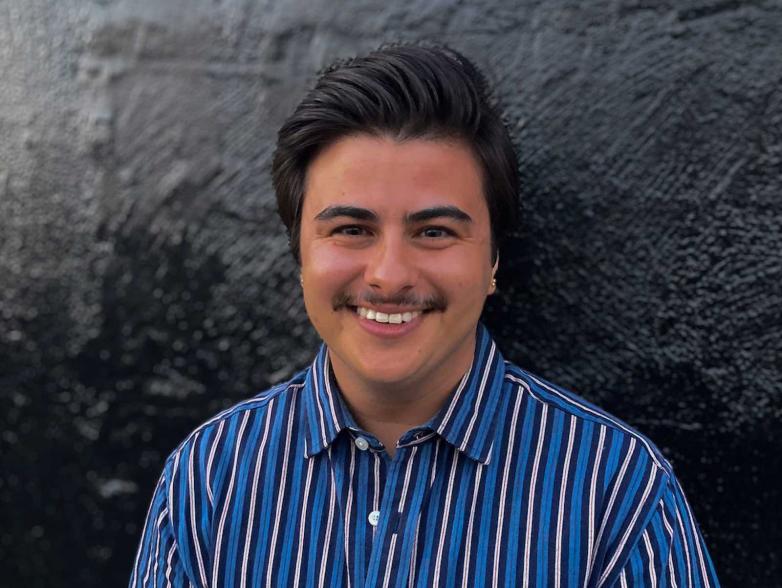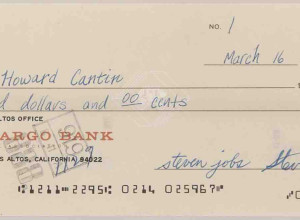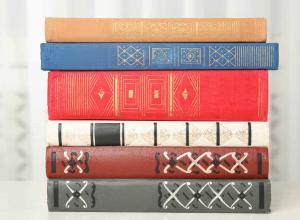Michael R Thompson Bookseller Javier Ortega on Book Fairs, Cartonera Bookmaking, and The Alchemist

Javier Ortega
Our Bright Young Booksellers series continues today with Javier Ortega of Michael R. Thompson Rare Books in Los Angeles:
How did you get started in rare books?
I started in the book trade right out of undergrad in 2019. I already had a few years of special collections experience, though - I had worked as an archival assistant at my school’s special collections library, the Ella Strong Denison Library, while getting my English degree. The Denison was a wonderful place to work and I was really invested in my job there. I was one of just a few student staff members who worked during the summers as well as during the school year. My friend, Mel Gilcrest, was another one of those students, and we would spend the days hauling boxes of books from one set of shelves to another and freezing down in the archives (even though it was ninety-five degrees outside). I also catalogued a large collection of contemporary poetry; helped archive a collection of ephemera, collector’s items, and newspaper clippings related to the JFK assassination; and spent a lot of time in the artist’s books collection, which fostered my love of fine printing and has led me to make books of my own.
My job at the Denison also exposed me to an amazing group of library professionals. My four years there were a transitional period for the Denison because the longtime librarian, Judy Harvey Sahak, retired at the end of my first year. That meant I was able to work under three exceptional librarians: after Judy retired, Susan Allen stepped in as the interim librarian, and then Jennifer Martinez Wormser got the permanent position during my last year. I also worked closely with Dorran Boyle, who managed the student staff and held it all together during the changing of the guard. Though I know it was a bit of a tumultuous period for the Denison because of the staff changes, I consider myself lucky to have met such a skilled and passionate group of people. The Denison was a perfect place to build my rare books career.
My actual introduction to rare materials, though, was my job at CAB Comics in my hometown in Arizona. I dealt with some valuable comics while working there, and I think that job gave me an appreciation of the rare and strange in pop culture memorabilia. I now love working with dime novels and other forms of old popular media—I’m very interested in mass entertainment, especially since so much of it is ephemeral and it’s always a small miracle for something like a nineteenth-century dime novel to survive in saleable condition. I also love the design of old advertisements and cheap illustrated material like the magazines in the JFK collection I helped archive. The brightly colored, attention-grabbing visual noise that surrounds any historical event is fascinating to me. Basically, I have worked with rare books for almost a decade now…if you count the kind of books that have drawings of superheroes in them.
So, after working at the Denison for nearly four years, I considered going into a master’s program for library science, but I didn’t necessarily want to go straight into more schooling. And, even though I was serious about my work at the Denison, I didn’t realize at the time that bookselling was an option as a career. I thought I might go into the publishing industry, but that didn’t pan out, either. For a frightening moment I thought I might pursue an MFA in poetry. Instead, I happened to send my resume into Carol Sandberg at Michael R. Thompson Rare Books at just the right time, and I’ve been working there for about five years now.
What is your role at Michael R. Thompson Rare Books?
I catalog, take all the photos for the business, answer the phone, help Carol with appraisals, and help run the booth at book fairs. I’m the only employee, so I also do whatever else Carol doesn’t do.
What do you love about the book trade?
I love that I get to handle something exciting and unexpected every day. One morning I’m researching an 18th century Spanish woman printer and by lunchtime I’m cataloguing a first edition of W.E.B. Du Bois’ The Gift of Black Folk. The next day I’m photographing incunabula and a stack of 19th century American novels. Or a book on entomology from 1685 and a children’s toy made two hundred years later. I get to be a generalist, which suits me because I am easily fascinated, and I love learning about everything.
Book fairs are also a highlight of my year. I think I really fell in love with bookselling when I had this serendipitous moment at my first Southern California ABAA fair in Pasadena in early 2020. Before the fair, I had been cataloging a portfolio of Grabhorn Press illustration proofs by an artist that we couldn’t identify no matter how closely we studied the Grabhorn bibliography. We brought the portfolio to the fair, though, since we deal in a lot of California printing material. That Saturday, I was walking through the lunch table area when I saw a man holding a plastic binder with a familiar illustration as the cover - it was one of those unidentified Grabhorn proofs, printed onto regular office paper. I went right up to him and asked him about it, and he explained that the artist was actually his wife’s uncle, whose work she had been collecting for years. He and his wife ended up coming to our booth, looking through the portfolio, and buying it for their collection. I felt like I had sold the perfect item to the perfect person, and it was an incredible experience to have right at the beginning of my career in rare books. The matchmaking aspect of selling books is still my favorite part of the job.
Describe a typical day for you:
I come into the office, I drink too much coffee, I field several callers asking for copies of The Alchemist by Paolo Coelho (I don’t know why that is our most requested title, but it is, and we never have it). The mail comes around midmorning and, if I’m lucky, I get to catalog some new books - if I’m unlucky, it’s just a UPS bill. In the afternoon, maybe I help Carol proofread an appraisal report, but most of the time I’m just cataloging, taking photos, or editing photos. I spend my day researching, photographing, and writing about rare books. What could be better?
Favorite rare book (or ephemera) that you’ve handled?
Probably Barbara Hodgson and Claudia Cohen’s Paper Botanists (2022), which is an artist’s book about the history, aesthetics, and science of botanical illustration. Each copy contains about 150 illustrated leaves that were either taken from botanical books from the last 350 years or produced by the artists using historical and modern image-making techniques, plus a folder of herbaria and additional illustrations. The book is bound by Claudia Cohen, who is an incredibly skilled and creative binder. It’s honestly one of the most beautiful things I’ve ever seen.
I also got to see the original typescript of The Picture of Dorian Gray at the Clark Library a few years ago. I had just read The Uncensored Picture of Dorian Gray (2011) after thoroughly enjoying both the 1890 and 1891 editions of the book, and it was amazing to actually see the edits made to the text before it appeared in Lippincott’s, particularly given the literary, historical, and even legal ramifications of those edits. I’m genuinely honored to have seen that typescript in person.
What do you personally collect?
I don’t really collect anything these days. I actually tied for first (with my friend Gabby Garcia) in a book collecting prize at my college in 2019 for my collection Further Possibilities: The Foundations of a 21st-Century LGBT Literary Canon but I haven’t kept it up since then. I think I’m more of a reader than a collector - as in, I like to put a cheap paperback in my backpack and go to the beach with it - and I don’t have enough room in my apartment anyway. That said, I do have plenty of poetry books that I’ve picked up because I can’t go into a bookstore without asking about their poetry section. I really enjoy the writing of Richard Siken, Inez Tan, Hera Lindsay Bird, John Ashbery, and Cameron Awkward-Rich.
What do you like to do outside of work?
Writing poetry is a common symptom of reading poetry. I’m now the secretary of the Southern California chapter of the ABAA, which means I write the chapter newsletter, and I incorporate a “Poem of the Month” in each issue. I’ll take any opportunity to foist my favorite poems on the people around me.
Aside from poetry, my major creative hobby is my bookmaking, which allows me to blend my creative writing with illustration, printing, binding, and book design. I’m inspired by the cartonera bookmaking phenomenon that emerged in Argentina in the early 2000s. Cartonera books are bound in recycled cardboard (cartón in Spanish) sourced from cardboard sellers (cartoneros) and sold cheaply, though the cartonera phenomenon has expanded into a whole independent publishing market, artistic tradition, and mutual aid structure as it has spread across Latin America. So, basically, I make books bound in recycled cardboard, as well as zines and paper. I use collage and embroidery on paper to decorate and illustrate the books, and I’m trying to develop my painting skills for my next project. My experience with artists' books and antiquarian books strongly influences my bookmaking - in my most recent project, I incorporated letterpress printing and utilized an illustration of the “wound man” figure from a 16th century medical textbook as the frontispiece.
I also love to swim and go to the beach, which are common symptoms of living in Los Angeles.
Thoughts on the present state and/or future of the rare book trade?
Overall, I’m optimistic, and I think that booksellers are more than capable of adapting to changing times. I’m most concerned by shrinking library budgets, which are a problem for the future of education and, incidentally, a problem for the future of the book trade. I hear a lot of anxiety - mostly from people outside the book trade, actually - that no one reads these days, everyone’s on TikTok, the kids don’t like to learn, and so on, but I think that the actual existential threats to the future of the book trade are greedy landlords and the politicians who defund libraries and public education. For me, the survival of library funding and affordable real estate are much bigger concerns than people’s individual interest in rare books. People love to read, people love to collect, and people love to be awed by strange old things. That love isn’t going anywhere.
Personally, I’m excited to build my skills as an appraiser, along with possibly opening my own bookshop in the (distant) future. I’ve really enjoy helping Carol when she appraises book collections, and I’ve been honored to help those collections find homes in libraries that can truly care for and utilize them. As a younger member of the trade, I’m excited to see the new crop of booksellers that will eventually take my place as the rookies in the room. I think we’ll be alright as long as there are eager new recruits joining the book business, and I think we have to do everything we can to encourage those people. I think Carol took a chance hiring me right out of undergrad and I will always be grateful that she gave me that opportunity. I hope that I can do the same for some bright-eyed nerd in the future.
Any upcoming fairs or recent catalogs?
I just compiled an online catalog of advertising material, mostly from midcentury “direct sales” companies like Avon. I also recently made a catalog of toys, games, and interactive books that I’m very proud of. You can find all our recent catalogs on our website here.
In terms of fairs, we’ll be at the Rare Books LA fair in October, and we will, of course, be at the ABAA fair in Pasadena in February of 2025. I’m on the book fair committee now that I’m an associate member of the ABAA, so I’m excited to contribute to the success of that fair. See you there.















